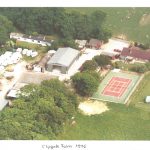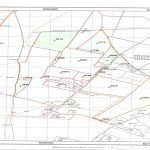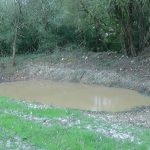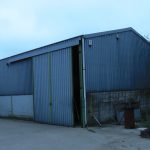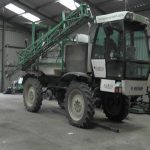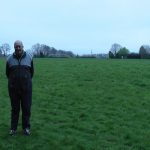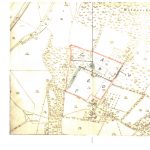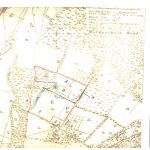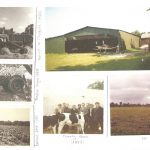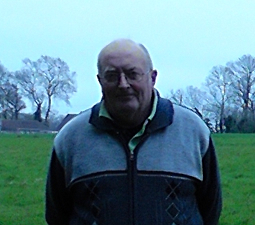
Bob Akehurst
About
| Farmer’s name | Bob Akehurst |
| Age | 67 |
| Location | Clipgate Farm, Denton, Canterbury |
| Size | 131 acres owned (300 worked) |
| Type | Arable |
Interviewed by: Anca Mamaische
Date: 22 April 2015
Transcript
[0:00- 00:34] conversation starts
I: First I would appreciate if you could tell me a few things about your farm for example what type of farm you have at the present.
R: At the moment we are an arable farm, and we grow a rotation of wheat, beans and rape in a four year rotation so it’s wheat-beans, wheat-rape. That gives a decent gap between crops for disease control. We’ve also over the years diversified to get an income stream because we’re not a very large farm starting with when I left school I started the contracting business doing work for other farmers with our machinery to make it more cost effective to have the machines to do our own. Then in 1983 the first aircraft landed here. You know we have an airstrip with 15 aircrafts hangared here, operating from here.
I: Mhm.
R: Then in 1986 we opened our caravan club site which has also grown and we store up to 30 caravans which brings money in…
I: Right.
R: For the farm to keep it going. The latest addition is… last year my son came back to work on the farm and he’s… we’ve bought a lorry which is operating, he is carrying bulk grains and that sort of materials.
I: Right, so what happens with the produce, yeah… with your crops?
R: With the crops, we grow… the oil seed rape is sold very swiftly after harvest and that goes into oils for food production and is sold directly to British oil receipts. The beans, they go for human consumption if they check out alright – because you can get the little weevil and I makes wholes and they don’t like them and they would go for animal protein. And the wheat is sold as either animal feed – depending on its quality and that all depends on the whether you get in the year – or biscuit production. That’s our main crops.
I: And do you work with the local market, the UK market or the international market as well?
R: Most of it is sold trough Grain Harvesters in Wingham. So you would call that…they are basically local but they are an international firm, you know, so it’s is fed into the larger firm
I: Yeah.
R: But we normally deal with the local firm.
I: Yeah. And the beans, do you work with supermarkets or with …
R: No! [laughing]
I: Local markets.
R: Do I look silly? [laughing] No. They all go through Grain Harvesters which is a co-operative, or it was, and it is now being bought out by Frontier. And they go into the main portal of feed beans or human consumption beans who is then sold for the world market.
I: Have you ever worked with supermarkets?
R: No!
I: Right.
R: I have looked from the outside and decided that they are too dangerous for me.
I: Right. Could you maybe… yeah… tell me a bit more why do you think they’re…
R: Well, in the time that I’ve been farming I have also been chairman of the local branch of the NFU, National Farmers Union.
I: Yeah.
R: I’ve also worked on the Technical Services Committee in London at the NFU and the number of times I had to try to solve problems between producers and supermarkets, where supermarkets are… I’ll be careful what I say but they operate in a very sharp manner and they’re not for the producer. They’re for their own shareholders and profit and you tend – if you get stuck with them in a big way – you can’t be having a diverse market. So if one market lowers, you couldn’t be putting your produce in a different direction.
I: Yeah.
R: You’ve got to keep, if you specialize in business, you take a very dangerous route, especially in farming. Because if that product goes out of favor or if the person taking it from you suddenly decides that they can get it cheaper somewhere else …
I: Yeah.
R: You are left with a farm full of produce that you can’t sell, and probably a packing shed full of people who you can’t pay their wages. So I’ve decided to go the easy route and deal with the public directly as per the caravan site and the airplanes and sell into the open market.
I: So when you’re selling to the local markets and you’re working with the local farm shops do you have similar problems or are there any limitations?
R: No, ‘cause that… that tends to [unclear 05:34]. You might not get… the thing about supermarket is that you either get a good price because thing are short or you get a very bad price. But going into the oat market with operations like Grain Harvesters you… they tend to flatten your problems out so get a price whether is… like this year wheat is only 110 pounds at the moment, where last year it was nearly 200. But that’s farming and you get swings and roundabouts. If you can’t take a joke, don’t join it [laughing].
I: Right, could you maybe tell me what’s a typical working day on the farm for you and then for your employees?
R: It depends on time of the year. During the winter months we do quite a lot of maintenance work on machinery we’ve got and sheds and also there is contract work comes in that I do for other farmers. This time of year this time of year I spent quite a lot of time driving the spraying machines, spraying other people’s crops and my own and doing other jobs. In a week or two’s time we should be – sort of end of May – April, end of May- June – the hay making will start and we’ll do a bit of that – although it’s less that at the moment than it used to be in the old days, I used to do that quite a lot of that – and then harvest starts. Then you go full tilt to get all the crops gathered in and into the shed and dry them and start preparing the ground to get next years’ crops planted in the autumn. And this is where farming has changed. When I started – when I was fifteen – most of the crops would have been spring crops, sown in the spring (barley, wheat) and you would have only had one or two fields that you put into winter wheat. So it spread the workload. Also all the farms have more animals. We had a lot of animals here when we started. We started with pigs and we went onto sheep and cattle and the workload was spread because you spread the manure on the fields in the autumn when you get a head start/hedge? [unclear 7:46] started and then you plow for the… and let the plowed ground to sit over the winter for the frost to work on and in the spring you plant the spring crops. But nowadays everything is rushed out because you’re trying to get maximum yield
I: Mhm.
R: Which you can’t get from the spring crop. You know, unless it’s got that growing length of time from the autumn it doesn’t seem to do the same. I know they’re looking at new varieties to try to improve the spring…
I: Right.
R: Spring production but until that happens…people are able to grow spring corn because the weather changes a little bit it’s not as stressed as people say but you got to be pretty slick to get it in the autumn, they’re turning wetter these days. But then again it’s machinery that has changed. Our tractors are all bigger. Believe it or not you can’t work as long with big tractors as you could with a small one because you could get on the land on wetter conditions with small tractors and keep going. So although one man can probably plough 30 acres a day when he was pushed to do 10 acres with a small tractor when I started. In the end it all levels out because the weather stops you soon with a bigger machine because you damage the ground.
I: Right. So I suppose it would be almost impossible to maintain the traditional way of farming or would it be…
R: It would be lovely but sadly you go into business, it’s… chances you’ll change. And that’s mainly because to be in a supermarket… when we started farming and had the pigs, there was a cattle market at Ashford, Canterbury, Sandwich, Lyminge occasionally, and now there’s only Ashford. Everybody put their animals into those local markets instead of straight towards the supermarkets as most people do and therefore all the local villages and butcher shops [unclear 9:42] and they [unclear] into the Canterbury market to buy the animals that are required for that week. And the meat consumption has gone down because people have gone… you know, this new dietary business where people want to live forever and all the rest of it but now scientists are slowly coming into saying that you need a certain amount of fat because it’s good for you.
I: Yeah, yeah.
R: In the end it all comes back to where we were 50 years ago [laughing]. Things just change and there’s nothing you can do about it. You know, if you don’t go with it you go down.
I: Yeah. I am a bit surprised to hear that meat consumption is going down. I suppose in… in those developing countries where they become a bit more reach they start to consume more meat. In developed countries, yeah, maybe meat consumption is declining.
R: Yes. Well, they had a great scare. I tell you, this is the trouble. Politicians are not that good for agriculture are they?! Because they went and made a scare about eggs and salmonella.
I: Yeah.
R: Well, I can remember as a boy, even before we came here in the 50s. When we were having chicken for Sunday dinner my father used to have light a range with a cold fire. You know, it was a cooker with a cold fire but it was safe, it didn’t matter and I remember him saying “I’d better start the fire earlier because we have chicken and we need to cook it well”. And when you cook it well it gets rid of the salmonella but everybody just stuffs it in the microwave or just quick flash cook and that’s where the problem came from. And with the traditional ways of cooking things go down, these problems arise and of course they overreact. It only knows one person to be full ill and they all stopped and that’s the reason when we first came here we started with egg production. That was our first [unclear 11:30] chickens. My father…
I: When was that?
R: We moved here in 1955 and that is the first ten acres we bought and that’s the letter saying it [see picture no. 4].
I: Wow…
R: It was £1200.
I: Could I maybe take a photo of it?
R: If you put any documents that you want, I’ll get a photocopy before you go.
I: Thank you so much!
R: And my father was an insurance agent selling insurance all around and he was selling his eggs in those days. They graded them you know. Large eggs which were certain weight, certain grams were 5 shillings which is 25p now and the mediums were 4 shillings which is 2… what’s a 10p, so it’s a 10p. Hang on, you’re going to wind this back, that 10p. No, what’s… You see I am old and decrepit, you can see that, [laughing] but they were 4 shillings and 5 shillings. That’s 12 old pennies and 5p it would have been 20p and 25p. Sorry about that confusion.
I:That’s alright [we laugh].
R: It’s the same problem working in acreages and hectarage. It’s 2.7 acres in a hectare.
I: Yeah [we laugh]. So, what made you become a farmer?
R: Well, I suppose, I moved here when I was 7 and I enjoyed the life, I loved it as a champ, riding the bike around the farm and out being on the farm. When I was 10 actually, about ‘58-’59, my brother – he was… he is older than me, 10 years older, and we started working on the farm but the pigs was dad’s – was called out to do the national service which means he had to go in the forces for two years. So then I was thrown into the deep bend, I had to do things like plowing and cultivating and getting the crop out and father getting the crops in because father was too busy with his other jobs and for two years I was sort of main stake, he only used to help if he could get around on the weekends. But… so I was sort of brought up really into having no [unclear 13:52].
I: Right. So how many generations before you were in the farming business?
R: It was just my father who brought the farm. Yeah, and it’s me and there’s Alan my son is coming to it. I hope that one day he’ll get married and have grandchildren, they’ll carry on but… [laughting]
I: That would be lovely… Ok… You mentioned politics. I’d like to ask you how has
the Russian embargo affected you?
R: It hasn’t.
I: It hasn’t…
R: No, as far as I. Well, it might have caused the depression in this wheat, I suppose if I’m honest. But that could have been just from… . I’m not a hundred percent certain but that would have been the only thing that it would’ve affected – the price of feed wheat – because we used to export a bit and they di… So this is where it’s all gone very volatile because you only need a dread in either America or Russia to make a lot of difference to our pricing because the world I think it’s on quite a [unclear 15:15] with its’ food production. You got war regimes nearly everywhere so that’s not helping food production and it’s a sad time really, it’s as bad as I’ve known it. I’ve never… There’s always been squeamish around in the world but never quite like it is at the moment.
I: So why would you think that this is happening now?
R: God knows [laughing]. They just… people can’t live with one another can they?
I: Yeah.
R: But that’s another story.
I: It is, yeah. Erm… what is your view on organic?
R: Organic? I have actually worked contract wise for people that grow organics and it [unclear 16: 05] at the early days in the fifties when we haven’t got any pesticides or anything to keep the crop clean. We used to grow, when we first started here we used to grow sugar beet which is a beet which they take… they used to take it to a local railway side which is in Aylsham, put it in a carriage, it’s like a….like a… very much like a parsnip and they take that and they produce sugar from it.
I: Mhm.
R: But that used to become covered in weeds and we had a lot more labor then, family labor and other people used to come and pull it by hand whereas nowadays I would go through them with machines spraying machines and keep the job quick. I mind it a bit what pesticides do and don’t do but farming wouldn’t be the same without them. The yields in organic are very suppressed. If you get a tone and a half of wheat to the acre you are a lucky person and if you get two tones it is an exceedingly good year. It’s… it’s like everything in this world. You can do it unless you mind going backwards.
I: Right. Hm! Do you think that there is a growing market in organics?
R: I think it’s… I think it’s sort of plateaued out.
I: Alright.
R: Yes, there are certain group of people that live and swear by it but I think that people are realizing that we’re not the ogres the press makes us to be or some people make us to be. We are not here to try to kill you, we just try produce you the food as cheap as we can and as best quality we can. For instance, apples, the orchards have gone for me because the supermarkets have taken a train in importing and you have to produce apples to such a standard that you get a lot of wastage because of a little blemish. [unclear 18.00] doesn’t like it.
I: Yeah.
R: But it’s got no problem. A little scab on an apple is not going to do you any damage at all. You peel the skin off and away it goes. But it’s all going to be shown in whatever color they want them, red, green, yelow. At the British side you got to have a lot of apples thrown away.
I:Yeah, that’s really sad. Do you think that happens with local markets as well or people are a bit more… [interrupted]
R: I think a local market is more amenable to using their common sense. And if you are talking about farmers markets and things like that and the… and the grain market, we all have to produce the grains to a certain… It’s all tested every load that goes in for moisture, protein and [unclear 18:45]. But I think buying… you know, what you’re taking about, its fruit and veg and eggs which they sell in local farmers markets now. I think people go in there and make their own opinions and buy and they’re quite happy to buy decent potatoes with a scab on it.
I: Mhm, yeah! We have already covered quite a few of the… Yeah. What does farming mean to you? How do you see it? Do you see it as a source of income and nothing more
or is it a passion as well or…
R: It is a passion, it is a source of income hopefully [laughing] but nobody could say that they don’t enjoy living where we do, in the countryside. You know, you wouldn’t do it if you didn’t like it. There’s also, because we diversified we meet a different lot of very nice people. It’s… yeah, no… it’s a far… it’s an income and a passion. It’s a joined venture. Sometimes the income is better than other and other times it’s a bit close to [laughing]. So I said before – if can’t take a joke don’t join.
I: Erm… Is it a full time job?
R: Yes! It is.
I: I am not sure if we covered this. How many employees do you have?
R: At the moment it’s family members
I: Family members.
R: So we’ve got my… my son, my brother, me and my wife who does more than part time really, but she does book work and term jobs on the farm. At one time when we were contractors advisers we were employing eight people. But they shut down, that’s…as soon as the big – you don’t get the warning they just walked in and they shut the research farm next door and that’s it! Bang! It was gone.
I: So, why did they close it?
R: We did that for about ten years, sometime ago we had… they had the research farm and I’ve put the farm workers in there as a contract.
I: Aha.
R: We had sheep and we had a shepherd and all sort of things.
I: Mhm…
R: But then when the shepherd decided he wanted to do something else, Avril and I looked at one another and said: “Do we really want to chase sheep round the field at our age? No! It’s a young man sport” [laughing].
I: Alright… Is your farm increasing in size or…[interrupted]
R: it has, but I can’t see it increasing anymore because of the price of land.
I: Right.
R: We’ve gone up… I’ve just worked out a few figures here. At the moment, because I share the farm with other people as well, but at the moment we are farming 200 acres plus 100 acres – 300 acres, of which we own 131 acres.
I: 131.
R: Yeah. We rent 68 acres of other people on a tena.. business tenancy type thing. And as I said, the rest of it is on a shared farming basis with Bridge Farm, down the [unclear 22:20] that was bought of Pfizer. The owner is not a farmer it’s a….
I: Right.
R: It’s a… and that’s all come from the 10 acres we started with in 1955. That’s 60 years this year, this month.
I: So how about the people that you’re working with. Have they changed through time? Are they the same farmers around?
R: Yes and no. There is a certain core I suppose of old time farmers [ unclear 23:05] but we’ve got… one or two people are now farming for people from big business, who’ve bought the land for debt duty reasons – and that’s why the price is going out. A lot of people are buying land – it’s up to £50 000 an acre in this area – solely to get the relief if they’ll keel over. For the families, you know, and it’s put an unrealistic price on the land values.
I: Mhm. Do you see any way in which this could be counteracted?
R: Well I think that someone is got to do something in the end. Either they will cap the dept duties which won’t worry me? [unclear 23:51] or…to say 5000 acres. But I don’t know what they will think about but when you got somebody owning thousands of acres solely to save the debt duty, the biggest worry I’ve got is when they’ve bought these farms, they normally sell the farm houses and the farm sets-off. So where the average size of farm, when we moved here, up this roads was ten acres. Because originally these farms were for the First World War offices for the army.
I: Right.
R: They had, the old house over there which was in a [unclear 24:28] and I’ll show you later and 10 acres as a pension and they gave them that, so this road was all 10 acres farms. Well, we bought the next one out and added to it. So we started … but when they/you buy 500 acre farms … or 200 acres even, like Bridge Farm who was sold apart it worries me ‘cause you got to rebuild the farm scene. If the size has gone down to a manageable size 5000 or 1000 acres so that it… the units were smaller you got to find houses and farm yards for these things again. Because they have been developed into, you know, even in this road we’ve got big iron gates with electronic controls going up which we’ve never had in the past.
I: Mhm… so basically they’re monopolizing farming.
R: Yes, it is…it came to my notice… I was machinery chairman in 1985 when first health and safety really took over and other things. We had the man from the house … and I mentioned a) being draconian because we were family/farming business and we wouldn’t put our family in danger and if you’re not a family business you’re an industry.
I: Mhm…
R: And that’s where things changed. It changed from being individual farmers to being on an industrial scale.
I: Yeah. So you mentioned that a possible measure would be to put a cap on … [interrupted]
R: Well, I don’t know what the politicians are thinking about, probably not, probably never happen because politicians are like everybody else that was just my thinking.
I: Right.
R: You know.
I: How about Farmers Union? Because it’s like a bridge between politicians and [interrupted]
R: I don’t think that Farmers Union will because this is a bit… well we can’t get going. This is… we all rely on our subsidies whether being the EU or in the old days it was the Government itself did it, which it actually a better scheme because when the British Government ran the system I can remember now, if they wanted more wheat or barley to balance the food chain here, in the country they would increase the subsidy on the product. You’d know in autumn that year thay they were gonna pay for barley. You adjusted the farm to get the crop that they wanted and that all stems from the war when we were producing food for ourselves in the war time. But then the EEC came along and took over and I don’t know if you can remember they had food mountains ‘cause it all went wrong. They had butter mountains and wine mountains and the fact they try to correct that by making us set-aside and putting land in other… you know, activities. But without the subsidies and the food prices as they are in the shop, agriculture wouldn’t survive.
I: Mhm.. Do you see any way out of this sittuation?
R: The New-Zealanders have done it. Erm … it could be done. I would say our inputs are quite expensive: sprays and fuel – fuel has come down a bit but spray isn’t – and other things are quite … are very expensive. If you could get a control on them, which I can’t see how ‘cause they’re private enterprise and a slight rise in food prices, which if you average out what the average person spends these days compared with the ‘50s or ‘60s ‘cause somebody was quite happy to pay 5 shillings, remember this which is a quarter of a pound for a dozen eggs in those days because they valued food.
I: Yeah
R: Nowadays, they’re probably the same price in the shops, not mu…you…well they’re probably lower if you work out the inflation of money, they’re probably half price what they were.
I: Yeah, so it’s becoming …
R: And you know, in my … I remember my mum doing a sort of budget and she would say … she didn’t had a rent because we owned the propriety and she would say: I need this for that, only this much money, I need that for groceries and I need … bla-bla… and she worked her budget out. But nowadays they say: Well I want 200 for my [unclear 29:24], I need 50 quid to go down the pub on a Friday night at the Duke of Cumberland; [he laughs] Oh we’ve got a tenner left for food. What are we gonna do with that? [he laughs]
I: Right…
R: Sadly that’s the way it’s gone. But now it’s… it will… people have ways to sort this stuff out I suppose. I have to… I am a bit optimistic.
I: That’s good!
R: If you weren’t optimistic you wouldn’t do it, would you?
I: Yeah! Right, so you mentioned that the machineries that you’re using have changed through time. Are they constantly changing? How quickly is that happening?
R: It’s too quickly, they’re always bringing out new models ‘cause it’s a very competitive market at the moment, because go back to the old system when we had a lot of small farms: our local dealer around here would have 20 or 30 small tractors and he’s just waiting to be bought and the fruit people around here would buy half a dozen a year. They would swap the tractors over. So the units were smaller and they were selling more – more diverse. Now, you buy one big tractor or perhaps two and they’ve got so many options on it – whether you have shower in it – I’m joking there [he laughs] – you know, air conditioning and cab comforts and the bits stuck on the outside that basically you order them and get them to order. So everybody is fighting for the orders. So, the machines are bigger, they’re more expensive to operate but they do a lot more work and nowadays you can’t work it on yourself like the old tractors – we did it all our own engineering and maintenance but you need a laptop stuck in them now to do a lot of work on them, to diagnose them and sort things our.
I: Right. So in other words… do you feel in a way compelled to purchase these new models and…
R: No. No. Not. I always buy second hand or recent second hand – should we put it like that? – because all new models tend to have faults and if you buy a machine that’s two or three years old, that not been abused, most of those faults have been [unclear 31:50], you’ve got a depreciation –it’s like a new car, the day you take it out the showroom it loses 2 or 3 thousand pounds, well that’s the same it happens to tractors – and you get a tractor at a reasonable price that’s operating properly. So I normally, I don’t think I bought a new piece of kit apart my generator over the last 20 years. Small tools it’s different –chainsaws and things like that – then no you don’t… you can buy new.
I: So now, we are gonna talk about how you see farm… your farm developing in the future and what kind of challenges do you see coming?
R: Oh, challenges. I suppose the biggest challenge is working with the volatility of the world market on the cereal prices. The weather has always been a challenge, and always will be. Erm… it’s not as easy to predict these days what… things move so fast, things can happen in the world that alter agriculture in a split second and in the old days if there was to say there was a war going on you wouldn’t know about what happened on the telly for about a week, ‘till they got the film back but now they’re actually videoing in real time. So, this is what I’m trying to emphasize: that things… the world is a small place. When my daughter went to Australia we got there on the day to see her in the airplane which few years ago would have been six years on a boat.
I: Yeah.
R: And she goes, she tends to like traveling with her boyfriend so I just Skype her anywhere in the world to see her so this is all different from very short time ago. So, it has… We do use technology quite a bit here actually, we’ve got a website, we’ve got an automatic weather station which I record all the weather (a) because of the airplanes and (b) because I am not a great believer in global warming aaaa…. [he laughs]
I: Right, so you’re doing a bit of science here…
R: Well, it’s unofficial, it’s for my benefit but the first year that I put that weather station up, the sensors on there, over there [points out the device] that’s got a temperature sensors who record every half hour.
I: Hmmm!
R: Right, and onto my computer in the office, and in the first two years, the overall temperature went down by half a degree a year and I’m thinking – what global worming? This is…it’s either wrong or they’re wrong [laughing] and … that’s my son and daughter behind there [pointing out to a picture on his tablet].
I: Lovely!
R: Could you see?
I: Yeah! So they’re not, are they here now?
R: Well, Kim actually worked in London – she works for Goldman Sachs, the bank – but Alan works for me, but he is… do you go into the Duke of Cumberland at all?
I: Well, I’ve been a few times.
R: Yeah, you’ve probably seen him. He goes in there Friday nights.
I: Right.
R: His friends and him sort of have a Friday night and then sometime I have to pick him up on the… on the… from… [unclear 35:42] but we’ve got an website…
I: Yeah, I’ve seen the website.
R: Did you had a look ‘round it?
I: It’s very informative, yeah.
R: Yes.
I: Yes.
R: I built it as an information block rather than constant news, ‘cause I can’t keep updating it. I do… erm…
I: I think it’s very useful to have a website and …
R: Yeah, for instance like… there’s a map on there [unclear 36:10] because we have a lot of caravans and lories
I: Mhm
R: You could just say to somebody: If you look at our website and click on the, where is it? That one there, you get… that map comes up that brings you up to the farm.
I: I saw that there are two webcams as well, are they still operating?
R: Oh yes, we’ve got more than that, we’ve got 8 ‘cause I’ve had a lot of burglaries. We had 8 visits by the ‘as you’d likeys’ [laughing] so if I go [swiping sound]
I: So you’re mentioning burglars. Do you think this is changing through time?
R: Yes!
I: A lot?
R: in the last few years it’s got worse and that’s because of the cuts to the police.
I: Right.
R: That one there in the airfield with the caravan scans like that.
I: Hm… that’s..that… did you managed to catch any burglars since…
R: Yes, they haven’t been back since I set this lot up but I’ll just briefly run what’s going on around here. We have… we’ve based 6 here ‘cause we’ve actually had some caravans. These caravans parked down the side who rode into and they stole 14 000 pounds worth of my nephews tree climbing and chainsaws ‘cause he can’t run his business from his own farm so they don’t live there.
I: Hm…
R: Then they broke into my chemical store thinking that I’ve got diesel in it and they pinched a four wheel drive off the field while the men were building my hangar den and I’ve had two lots of aircraft fuel stolen about 50 litters a time.
I: How about dogs, do you have dogs on the propriety?
R: I’ve got a dog yeah, it’s …they’re very good. The modern thieves we’ve got around here are in and out the farm, you don’t realize it and they would take anything from a tractor to your grandmother if you leave her standing there in the yard.
I: Do you think this… how.. is it going to get worse in the future or… [interrupted]
R: Yes ‘cause they’re cutting the police all the time! When… I’ve got policemen applying, retired policemen and when they were training back in the ‘70s or ‘60s there was 90 oficers in the rural. There was a police-house in Barham – just on the edge, you’re going to Barham on the left-hand side that was a police house – there was two policemen in Bridge, Elsham police station was open – it was a full complement of officers – now we’ve really got one that comes up from Dover [unclear 38: 35] they’ve let him out in the rural [38:36]. Well, a one man army, he’s got to have time off.
I: Yeah… yeah.
R: You know, we all moan about them but what’s left of the police force’s doing a marvelous job against all odds. I’ve been 30 years in Neighbourhood Watch. I’m chairman of Dover and I have been county chair for ten years stint at Maidstone soley because I am a believers you can’t criticize unless you had a go yourself.
I: Yes.
R: People that are standing on the side line saying: this is not right, this is not wrong, if they never had an attempt to out these people and the police need our help and they need information and they need support, if you have never done that you’ve got no right to criticize them.
I: Community collaboration…
R: Yeah. We’re getting on very well now, our local policeman has got 90 texts. When you post a text on missing vehicles or suspect vehicles it sends it to 90 people now which is a lot of eyes to watch for it.
I: Yeah.
R: Anyhow, we’re off farming [laughing]. It’s all a rough shoot because you know, it’s a problem.
I: It’s… it’s quite relevant. Erm… I also saw on your website that you have a pond that you’ve build…
R: Yes.
I: In what year?
R: Yeah, and we just reconstituted it.
I: Mhm…
R: Alan did that last year ‘cause it did get overgrown. I made the mistake of putting bulrush and it went down to it’s clay and it drained. So yeah, we’re on for reviving that.
I: Right.
R: We’ve got a very positive attitude to… I used to breed and release barn owls.
I: Hm!
R: Until English Nature and the RSPB decided we couldn’t do it because the survival rate is 25% and that’s exactly what it is in the wild.
I: Right…
R: Did you know that wild barn owls if they run short of food will take the smallest chick and feed it to the others?
I: I, no! [laughing]
R: [laughing] Sorry mate, it’s for dinner.
I: Well, that’s nature and surviving I guess [laughing].
R: So, I spent a lot of time doing that. I used to go to a fair way up country to get the chicks from the hatchery whey they’d… they’d got surplus birds with the cock birds they didn’t want and I used to raise them up to freedom and release the offspring but we were suddenly stopped by licensing which was unfeasible to get because if I was… if I would’ve got a license I would have carried on but If I had a license or a site where I’d release them and it included telling all the local bird watchers which means they’d all turn up watching for the birds and ruining the job completely ‘cause barn owls do like to be discrete. If you put them on a site and people don’t get around it too much they will stay [unclear 41:29]. But, wildlife is chang… if we’re talking about wildlife, do you want to talk about that here?
I: Yes, yes!
R: It has changed. In my lifetime. Now, there’s two or three reasons why the major changes are. Small bird populations like hedge sparrows and things like that were very very prevalent out here. We had flocks of them but with the new food regulations we had to shut our feed stalls down…
I: Right…
R: So the birds couldn’t get in and feed. For instance, at the end of my shed we had a food stall for the pigs and you’d get knocked over by flocks of starling and sparrows coming at the door when you walked up to it ‘cause they’ve been in there pinching pig grub. You’re not allowed to let them in anymore, because either salmonella and so forth. Also, there’s more predators about now. We’ve got buzzards here, I’ve never seen in my lifetime. There’s up to four circling in the sky sometimes in this area.
I: I do… I do see them on Railway Hill as well.
R: Yeah. They weren’t here but they’ve taken…also we’ve got new legislation which protects certain species like magpies which are not supposed to take but magpies are the worst for small birds. They are vicious; they go along the hedge and take all the little birds out but you are not supposed to… We had a larsen trap before the law came in on the back lawn ‘cause I was fed up with loosing blue tits ‘cause I’ve got a box here, I think we still got blue tits in it and we’ve caught 11 magpies in one afternoon in it. Well they do a lot of… 11 birds do a lot of damage to small birds. If they are taking two or three a day every day, it adds up. Of course, you’ve got the debate about badgers but they’re another thing. I’m just looking at that bumble bee flying around over my lawn. Out there, look. See?
I: Yep.
R: They’re crucifying them, they’re crucifying the ground nesting birds, they eat all the starlings, all the skylarks, eggs and the plovers eggs that we used to have in the fields and it’s mainly because they are overprotected. There’s badgers everywhere in this area, you see them dead on the road. We never saw them before because they were elusive but now I think they’re getting short of food because it’s… the population’s grown.
I: So, from what I understand, you feel that everything is a bit overregulated…
R: Yes, when things go overregulated the people put in charge of overregulation – and now I’m gonna be careful, you’re doing a [he laughs] wildlife degree…
I: I’m trying to be as objective as possible.
R: Yeah. When you do look at problems in your career keep an open mind on both sides of the incident.
I: I’ll try.
R: Because if you go blinking ? [unclear 44:24] to saving solely the wildlife now well… nightingales [unclear 44:40] every year they used to sit and sing. Our woodlands, every year, a section of it was cut for paper pulp, peep props for the coal mine when they were done and skylarks love freshly cut wood, they go in among the stumps and nest. They don’t like fully grown wood so we had pressure on them. They not only shut the coal mines but some brights sparked all about recycling paper. So they started recycling paper which meant that there was no trade for the pulp wood and they shut the factories in Sittingbourne town. They use to make paper. Now, if I cut wood down to recycle it like it should be because the trees will die if they’re left too long ‘cause they just get too big and just fall over, like coal was produced like that in the middle… you know in time gone by. I cut wood. I got to send it either to Wales or Yorkshire to have it processed which the transport cost takes any profit of the money that we would make, so therefore I don’t cut it. So the wood is deteriorating because of (a) the mine shut, they don’t want pit props but also because people are saving paper and recycling it.
I: So… This is quite interesting because you mentioned earlier EU regulations and subsidies and set-asides. Do you think the agri-environment schemes that are run under CAP now help you with all these issues in a way or…
R: No, they don’t. They got it completely wrong.
I: Right.
R: You’re not allowed to cut your hedges every year. Right. Now, when we had all the small birds, think back, the farmers… well, granted they were doing it by hand but every year they trimmed the hedges and made them nice and neat and a nice thick hedge although it’s smaller it’s thick. Little birds go in there and the predator can’t get them. When you leave a hedge for two or three years it gets a lot of frondy branches which the predators can sit on and they can walk in and they can grab what’s in the nest. It’s not thinking… Well, a lot of people… can we say this… we noticed it when they brought all these schemes in we got a lot of people who’ve done degrees like yours and I’m not gonna be unkind here but they came straight into… they got jobs with DEFRA on this side of it and they got a one-way view with an inability to listen what farmers talk to them at in the meetings and I was there and this is what’s gonna be done this is the new scheme, and farmers were saying: well that ain’t quite right, cause believe it or not farmers are not vandals, we live in the country side, I like… I’ve got blue tits and I like… you know… sometimes I’ve sat in the garden with Avron? And we heard a bird singing and I’d say: I’m a failure, that one’s still singing [laughter]. But, you know, there are… you’ve got people that have got really solid ideas and you can’t budge’em and they are doing a lot of damage, but not willfully ‘cause they think they’re right…
I: Right…
R: But if you… if one thing comes out of this interview, if you keep an open mind all the time in your career and think both sides of what ifs, rather than just oh this looks good on paper…
I: So do you think that it’s still a one-sided…
R: Yes!
I: Nothing changed?
R: No… I’ve never taken on the environment schemes – a) because I’ve got a pond and they would regulate it so much that I probably couldn’t cope with it but I’m quite happy to do what I can do and get it going – and b) with the diversification I’ve got if I need an odd tree out I’m not adverse to take it down. I need to cut the edge at the end of the runway at least once a year so the airplanes don’t hit it whereas if I was in agri-scheme I’d have to leave it for two years and it would probably be a safety issue…
I: Mhm.
R: Growing up. So… they believe… it’s… it showed up when we had our hurricane. We’ve… in this area like Charlton Park, do you know Charlton Park as you go towards Canterbury? If you go up the hill from Kingston…
I: Mhm.
R: You’ve got Charlton Park on the left hand side who’s got loads of big trees in it. Well, they were planted for furniture making.
I: Right.
R: So when they got to say 200 years old, they go at it and suddenly cut the old boy down and they make their furniture but they plant another tree.
I: Mhm.
R: Now, with the tree preservation order you can’t touch them until they’ve fallen over and they’re useless.
I: Hm…
R: Can you see where I’m coming from?
I: Yeah, yeah!
R: You got to refresh things. Things don’t live forever in the rural. That goes for farmers as well [he laughs].
I: Do you think that this is gonna change in any way in the future?
R: What? These laws?
I: Yeah, these laws and… or how could they be [interrupted]
R: I don’t know how because everything is so one side at the moment. I’m gonna have a chat to your boss ‘cause he’s interested in this quite seriously. He calls them the ‘floppy advocators’ [unclear 50:10] I think, and when you got people like Chris Packham – I don’t know what you think of him – but when he says that all research into cancer should be stopped and all the money put into wildlife, that’s not a very pleasant man, is it? Whatever you think of wildlife and he did say that in a newspaper article.
I: Hm… that’s a very one-sided approach…
R: It is, yes. Erm…and he’s completely… says that the badgers don’t take ground nesting birds but every farmer in the area sees the evidence. We’ve seen them disappear, we’ve seen holes in the fence lines ‘cause bumble bees normally nest along the fence line like that, they all make an underground… ‘cause they know you’re not gonna dig but… but you go along and you’ll see all these holes like that where the badgers have dug them out and eaten their nests and disturbed them and you can tell them ‘till you’re blue in the face and they say oh no, they’re vegetarian but on its own spring watch last year they swam here to an island and ate all the little baby avocets and they said ‘oh, that must be a rogue one’. Well, the man’s blinding itself to what’s going on.
I: How about… I don’t know, hard evidence – taking pictures and… Do you think they’ll maybe take that into consideration?
R: I don’t know. It’s a hard job to do ‘cause I’ve been sort of preaching moderation ever since it all started but you get people that are fanatical and they can be very persuasive and you get numbers against you what can you do? You can only… and then you’re looked on…actually if you say too much you’re looked on as a heretic really or an anti-nation… but… anti-environment, but we’re not! We’re not really. It’s just we live with it and we know actually what goes on. We don’t have rose tinted glasses, we might have a few smudges [he laughs] but that’s life.
I: Right… erm…
R: I’m not putting you off your degree [he laughs].
I: Not at all! I am quite aware of these problems. I hope, I don’t know, in the future…
R: So what do you ought to do in the future with your degree? Work in agriculture or…
I: Erm… I think I’ll do a Masters degree and study further. Erm… yeah I want it to be food related.
R: Yeah, good. Well, if I’ve had any influence on you, that’s [unclear 52:55].
I: I’m sure, everything…yeah!
R: You’ll meet a lot of interesting people. I don’t know how many interviews you’re doing. Are you doing more than one or…
I: Yeah, more than one.
R: Yeah.
I: We need to interview 50 farmers in total. I’m looking to see if there are any other issues that we haven’t discussed. Do you have anything else that you would like to add?
R: Erm… I hope that common sense comes back to everything [laughing] but I can’t see that, that’s a long hope that is but you know, it would be nice if we could get stability back. This is what we lack these days, it’s stability. We’ve got an election coming up now and whoever wins will have their own ideas and we’ll have to swing with it but you could… long term it’s what’s wanted in both for the country and for agriculture. Everything is so short termed at the moment that we’ve just got this old system of subsidy going, with the paperwork and they decided to change it all, and it’s all gone wrong. I’ve got sheets and sheets… oh, I’ve brought my phone now -for my subsidies – I brought it in to show you – is 40 pages long.
I: Wow…
R: I had to print that off ‘cause I couldn’t do it online.
I: So you’re doing it yourself?
R: Yeah.
I: Can you contract someone to do it for you?
R: Well, you could do but…
I: It’s probably expensive.
R: I got to find the figures for them, so shall have to try and sit down and do it.
I: So do you think this could be simplified?
R: Yeah. Of course it could, you don’t need 40 sheets of paper [laughing] it’s because they’ve brought the environmental side in it we now have grain in which means we’ve had to change… well I’m alright ‘cause my rotation was spot on with the beans in it, but other people who’ve been growing wheat and rape they’ve had to bring other crops in which will probably suppress the price of my beans ‘cause people are growing beans now to put green in. It gets 0.7 of a hectare for green in, for beens, so you got to have enough of them to bring it out at the amount that you want onto that point.
I: So they impose in a way what you’re allowed to grow?
R: What we’re allowed to grow, yeah.
I: So that didn’t happen in the past. When did this started?
R: Well this, it started to creep in and it started with environmental side on the last system but this has really kicked in now ‘cause… I don’t know why but…
I: So why…what are they trying to do. Are they trying to avoid monocultures or…
R: You ask me? [laughing] They’re politicians. They just get a [unclear 55:50] idea: this is where we’re gonna get the votes from ‘cause everybody’s turned green…
I: Right.
R: And then it doesn’t matter whether it works or not, that’s what you got to try and do. Makes me sound a bit caustic but…
I: Well, I hope that… yeah, we’ve covered pretty much everything, if we could yeah, maybe take a look at these documents.
R: Yeah, if you want to look…
I: I think I’m gonna stop the recorder.
[transcript of AKEHURSTB_recording_pt2.wma; we are looking at pictures/documents]
[irrelevant up to min 1:25]
R: This is young farmers in the early days, that… we formed a group in the young farmers because two or three of the farm lads played and we did pantomime and things.
[1:40 -2:12 irrelevant section]
I: So do you think that young farmers have similar meetings now?
R: Yes, they do. My nephews and nephew sons and my son was in it, my daughter didn’t go, I don’t know… ‘cause she go up to uni quite quick to do a sports degree, but it’s an ideal meeting place for youngsters from the rural area and they do a lot of good things, they have a lot of fun, the probably drive too…
I: Similar interests.
R: They probably drive too fast but…
I: Oh.
R: Yes [laughing] and they do charity work and it gets the chance, ‘cause a lot of the girls, you don’t have to be a farmer so young ladies from town join up ‘cause we have… she was a beautician in a department store for instance. She wasn’t connected with farming but she just came along because she liked the things that we were doing – we’d go… visiting farms and parties and… great party girls in the winter [laughing]. So… and it is an international organization. My nephew went – Derick – to New Zealand on an exchange with them. I don’t think this is…
I: That looks like the ‘70s.
R: Pardon?
I: That looks like the ‘70s. Yes.
R: Yes, yes…
[from 03:40 until 8:31 going through pictures, he is showing me pictures of his family, his wife’s family etc.]
R: Oh that’s down near the pond.
I: What year is this?
R: That could well be back when I built it in the ‘80s. [unclear 8:42] Yeah, there it is there, see? That’s looking the other way, that’s looking from over here, when it was… it’s basically…
I: Yeah, it’s quite…quite big.
R: Yeah, it’s a …it’s… we got it down a bit at 2.5 meters ‘cause I did a bit of research on it. Oh! That’s another thing. We had the farm inspected 2 or 3 times while they were farming the wildlife group. Hoagy? [unclear 09:06] used to be called but… and I took advice on the pond ‘cause you need a certain depth to keep the temperature right. If it’s too shallow it warms up too quickly and…but if you… you want it at least two meters deep.
[from 09: 20 – 12:18 going through pictures, he is showing me pictures of his family, his wife’s family, his phone is ringing, etc.]
R: Because I can’t here that ringing when I’m driving the spray or the tractors my children bought me that.
I: Oh wow.
R: [laughing] that for Christmas. It shakes my wrist
I: When the…
R: When the phone goes…
I: That is… that is brilliant.
R: It’s a pebble. It’s not… well… it’s not the iPhone 1 ‘cause they’re a lot of money but it’s… it’s a watch and…
I: Oh wow.
R: You can get your messages up and all sort of things.
I: That’s interesting.
R: You never know what you’ll find on a farm. So I’m not as Stonehenge as I look.
I: I am sure that you’re not… yeah, with all these changes… you’ve probably learned to adapt really quickly and…
R: Tow piece of advice my father gave when I took over from him, running the place for us: If you start selling bits and pieces off to pay your bills, sell the lot; because you won’t end up with nothing in the end if you have to [unclear 13:28] if you’re not making enough money to cover your expenses. The other bit was: don’t specialize. Eg. When we had the chickens we never put a special shed for chickens and the new hanger I’ve put up is taller than it needs to because we put grain all around here. If we get an emergency we can tip the trails in there and put grain in here. So should [unclear 13:53] to aviation and the aircraft go away you’re still utilizing the farm building. So, it’s just common sense really.
I: Yeah, yeah. So how do you see your farm evolving? I don’t know maybe after… in… in… 10 years – 20 years?
R: I don’t know if I can answer this because it all depends what happens to the world but what it runs, I’ll go with it and I think Alan will ‘cause he’s… he’s my son, ‘cause he’s like me, he’s a… fairly switched on I think and I have… and hopefully he’s doing a wonderful job with the lorry so it… it’s got its draw backs because [unclear 14:55] to socialize. It will leave here at 4 o’clock Monday morning, we don’t normally see him until about 6 o’clock Friday night ‘cause he’s got a sleeping cabin.
I: Right.
R: And he goes off and he keeps picking up loads until Friday comes when he’s got to have time off and comes back. So it’s not always running back empty to get back here at night so things like that so he just stays with it and keeps going and it’s making good money ‘cause it’s not having wasted journeys.
I: It takes a lot of dedication I suppose.
R: It takes a lot of dedication and I’d say it is affecting his social life a bit ‘cause he can’t get out in the evenings to meet people or there…you know, partners but that’s… plenty of time, he’s 31 so somebody will come along and learn to drive the lorry with you [laughing]; but… but now… he decided to go that route. He started working here when he was… left school at 18. He didn’t go to uni but he’s done just as well. Kim went to uni and did a sports degree, she then got a job in a… she had two years operating Greenwich University sports team abroad – she’s very good at organizing – she then went to a job in a… where they find people for other firms [unclear 16:22] or thing and then a friend of hers got her into Golden Sacks [unclear 16: 28] the banking and she was administration and they’d crush and the first thing she did was to put all their figures onto a spread-sheet ‘cause they were doing it in long end and the bosses were quite well impressed with that so that they promoted her upstairs to being a PA to a group of BIAS and she’s worked her way up. She’s done extremely well: a) because she puts herself out and she’s… ‘s pretty switched on. When they were talking austerity they all used to fly first class which they still do to America but when they go to the continent it’s only an hour’s flight and they say they want to save money so what she did…she booked them all on the Easy Jet. They go: “But there’s no first class”. She said “No, you can’t work on there, it’s only an hour’s flight, you talk to somebody normal”. [laughing] “Come back” they said: “Oh, it’s quite reasonable, we enjoyed it. We was talking to people” and you know. Well, you don’t need food for an hour’s flight and you know, it saves the company a lot of money and they realize that there’s normal people out there. But… she’s just of off to Venezuel… not Vene… . Her and the boyfriend they’re going for a fortnight to South America somewhere. I can’t think where it is, it’s… but she does all the travel so…
I: It looks like you are really proud of…
R: Oh I am, yes, they’ve done well. Then, you know Alan as I was sayin’ he started here when he left school 18 or… yeah, 18. He was working with us for 2-3 years until Pfizer shut the farm and things quieted down him down and he said: “Look, I’m surplus requirement here, I’ve… could… I’ve been offered a job on… [unclear 18:10] which is a big farming enterprise. I was very upset at the time, I thought ah… but I said: “You take it mate, see what you can do”.
I: Yeah.
R: Well, he went there and got all his certificates for all… loadings… loading machines and other bits and pieces, spraying tickets and he got on very well and then he was offered a job somewhere else, with more money, and he went there; and it’s all putting him good [unclear 18:37] because he’s got all the paper work he needs and then he worked for somebody driving a lorry and he said to me… he said: “ I’d like to come back on the farm”. I said: “Yeah, I would like you back here as well”. Especially harvest and [unclear 18:52] time. He’s got time off with he’s [unclear 18:53] the lorry up for two or three weeks. And he said: “ [unclear 19:00] buying a lorry”. I said “ Well, the first thing you’ve got to do is go and chat to your boss and tell him what you want to do because we don’t want a lot of aggravation ‘cause if people get upset ‘cause you’ve started up in opposition.
I: Yeah.
R: I’m a great believer in being straight with people. It’s so much underrated these days but in politics and in business in my day if you shook hands that was it. Nowadays it’s only one or two people I can do that to and I know that deal will stay. Most people are very sharp, they will stab you in the back [unclear 19:32] to look at you.
I: Mhm.
R: [unclear 19:35] Anyway. He went, saw him and he said “I thought you would’ve done it 2 years ago”. So he said: “You think I can help with anything?”. You know, so we bought the lorry, didn’t know if he’ll make it or not. He had to take a chance. He’s done excellent. It really has.
I: So what do you think that made him come back to the farm?
R: Basically he’s a farm boy. A… ‘cause when it… when I broke my ankle we were hay making and he had a day off school. We actually [unclear 20:10] what happened to do bailing ‘cause he was good at it and we went and saw the teacher and said look, I’ve got a broken ankle we need to [unclear 20:16] is it alright to off for a day. No she…he said, ‘cause that’s what he’s gonna do for work he said and it’s as good as being to school so do it and he can do it so, that’ the trouble with the education system – the practical side of it is not what it used to be. A lot of people would be very happy going into apprenticeships, learning skills as engineers on the ground in full work where people actually know what they’re on than what they’re doing at the moment. They’re trying to force everybody down the academic route. Not everybody is built to do it.
I: That’s true.
R: Ai?
I: That’s true.
R: I’m not talking silly am I?
I: Yeah, not at all. That… that’s very true.
R: You know, I didn’t go at university, I did City and Guilds day release when I left school at 15. I went to the Canterbury Technical College and I did the day release City and Guilds which was… is a sort of diploma you get in agriculture and I did the crop production, machineries and animalized [unclear 21:20] and then bits and pieces. But the biggest thing that I was really chaffed with and that was quite later in life, it was about 20 years ago, I did my pilots license.
I: Right.
R: And I thought as I [unclear 21:36] education, rather went to secondary school at Brockhill that it might be a struggle and basically I walked in at the minimum hours, 38 hours and I though well that’s not bad for an old chap that hasn’t been to uni and… ‘cause it’s quite a bit of paperwork involved in doing it then exams but… navigation and everything else and I find that very satisfying.
[from 22:00 to 25:06 discussing about his brother’s profession etc.]
I: So this…
R: That’s the old bungalow.
I: Yeah. Can it still be inhabited?
R: Yeah. We’ve got one of my sisters in one end and… it was actually two bungalows.
I: Mhm
[the bungalow appears in several of the scanned pictures; from 25:18 to 31:10 looking at/dating/discussing about the photos]
I: So are you still growing cattle?
R: No. We used to… up until two years ago we used this shed. We put this building up for Pfizer actually to store their cattle. We used to have 150 in there. They would come from Whales those calves, go in there and they kept them here as a quarantine and then after they’ve been here 3 weeks or for 2 months they would take them down to their farm…
I: Right.
R: To use ‘em as control groups or whatever. They just tested [unclear 31: 36]. But that was our own cattle we had in the early days, but we used to use part of this barn and rent it out in the winter but Avril has had a hip replacement, I’ve had two hip joints done.
I: Mmm…
R: And cattle, it doesn’t matter how small they are now by the end of the winter they’re quite big and they get quite boisterous and we decided for safety reasons we wouldn’t do it anymore.
I: Yeah.
R: You got to know when to…
I: When to change… [laughing]
R: Yeah, when to give over.
I: Yeah.
[from 32:08 to 37:23 irrelevant section]
R: [discussing about photos] It shows you how time flies. In our kitchen we’ve got an oak table we have built for the millennium, 2000. Do you realize that’s 15 years ago?
I: Yeah.
R: And it seems like yesterday. All of this has gone by in a flash. You don’t realize it just happened and…
I: Yeah… [unclear] it’s life. Yeah…
R: It is. So my advice to you is make the most of it ‘cause it goes by extremely quickly.
I: I know… I am aware of all of this… [laughing].
R: You are aware.
I: Already, yes.
R: You know, there’s not much I would change in my life but you think where it’s all gone? I would spend more time with the kids I suppose, but that’s the only… but you don’t realize it.
I: Well, I’m sure…
R: You think you’re doing the right thing by working and trying to keep things going and… but you can never get it back.
I: Mhm…
[from 38:27- 59:33 to we’re looking at pictures, the dialogue is irrelevant to this project].
Audio
Photos and Documents
Bob Akehurst Interview Archive – Download .pdf version
Clip Gate Farm 1970s, 80s photos – Download .pdf version
